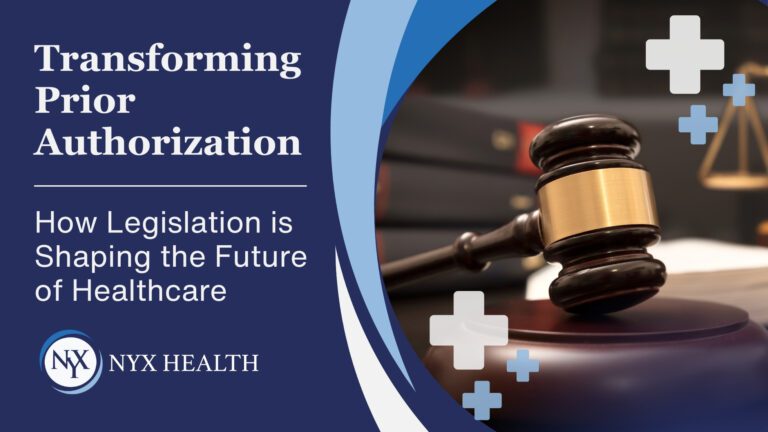Transforming Prior Authorization: How Legislation is Shaping the Future of Healthcare

Prior authorization (preauthorization) has long been a cornerstone of healthcare administration, designed to manage costs and ensure appropriate care. However, it has also been frustrating for providers, patients, and payers. The evolving legislative landscape surrounding prior authorizations aims to streamline this process, reduce administrative burdens, and improve patient outcomes.
The Need for Legislative Change
Prior authorization requirements can create significant delays in care, with providers often facing time-consuming processes to secure approvals for necessary treatments. According to a survey by the American Medical Association (AMA), 93% of physicians report care delays due to prior authorization, and 34% say these delays have led to adverse patient outcomes.
In response, legislators and healthcare stakeholders have advocated for reforms to make the process more efficient, transparent, and patient-centered.
Key Features of Prior Authorization Legislation
Recent legislative efforts, both at the federal and state levels, focus on addressing the challenges posed by prior authorizations. Key elements include:
- Streamlining the Process
- Many laws emphasize adopting standardized electronic prior authorization systems, reducing the reliance on manual processes like phone calls and faxes.
- Shorter turnaround times for approval decisions, particularly for urgent cases, are becoming a legislative priority.
- Improving Transparency
- Payers are required to disclose their prior authorization criteria and provide clearer guidance to providers.
- Some legislation mandates regular reporting on the number and types of prior authorization requests and denials to ensure accountability.
- Reducing Administrative Burden
- Reforms often include provisions to exempt providers with a history of compliance from certain prior authorization requirements.
- Efforts to align requirements across payers help reduce the complexity for providers managing multiple insurance plans.
- Enhancing Patient Protections
- Laws increasingly focus on minimizing care delays by requiring payers to honor prior authorizations for a set period, even if the patient changes plans.
- Denial appeals processes are being streamlined to ensure patients can access medically necessary care without prolonged delays.
Federal Initiatives: Focus on Medicare Advantage
One notable federal effort is the Improving Seniors’ Timely Access to Care Act, which targets prior authorization practices in Medicare Advantage plans. Passed with bipartisan support, this law seeks to modernize and streamline prior authorization by:
- Mandating electronic processes.
- Establishing timeframes for decision-making (within 72 hours for urgent and 7 calendar days for non-urgent – by 2026)
- Increasing transparency around approval rates.
- Requirement of HL7® FHIR® prior authorization application programming interface (API), used to facilitate more efficient electronic prior auth process between providers and payers with automation.
This legislation is expected to set a benchmark for broader reforms across other payer types.
State-Level Advocacy
Many states have also enacted or proposed legislation to address prior authorization concerns. For example:
- Texas has implemented laws requiring payers to respond to urgent authorization requests within 24 hours.
- California mandates the use of standardized electronic systems for certain payers.
- Minnesota enacted legislation that prevents the use of prior authorization for nonmedication parts of cancer care and mental care. For a chronic condition, prior authorization does not expire if treatment doesn’t change.
- Vermont Governor signed a bill that says patients with chronic conditions do not have to continually get new prior authorization for treatment that is unchanged, and insurers must respond to urgent requests within 24 hours.
- Wyoming enacted legislation that exempts physicians from prior authorization when they have a track record of consistently being approved for certain procedures/medications and requires that prior authorization for patients with chronic conditions remain valid for longer periods.
State-level actions often pave the way for federal policies and provide valuable case studies for broader adoption. In most of the above legislation, chronic conditions are the focus, as any delay can impact the treatment negatively.
The Role of Technology in Reform
Technology is a critical enabler of these legislative changes. From integrating artificial intelligence for real-time approvals to leveraging interoperability standards, advanced solutions are making prior authorization faster and more reliable. However, widespread adoption remains a challenge, requiring investments and collaboration across the industry. Outsourcing your prior authorizations to a technology-driven expert vendor can streamline operations for your facility. These specialized vendors leverage advanced tools and systems to optimize and enhance the efficiency of prior authorization processes - all at a cost that remains affordable for your organization.
What These Changes Mean for Providers and Patients
For providers, streamlined prior authorization processes mean less time spent navigating administrative hurdles and more time focusing on patient care. Patients benefit from quicker access to treatments, fewer disruptions in care, and greater confidence in their healthcare journeys.
Looking Ahead
As prior authorization reforms continue to gain momentum, collaboration among payers, providers, and policymakers will be critical to ensuring these changes have a meaningful impact. While the path to transformation may be complex, the goal is clear: A Healthcare System That Balances Cost Control with Timely, Patient-Centered Care.
NYX Health – A Trusted Prior Authorization Partner
NYX Health is a revenue cycle management company that provides prior authorization, medical coding, and medical claim review services to healthcare facilities. Our prior authorization department handles the administrative tasks associated with securing authorizations, so you can focus on providing quality care to your patients. Our customizable suite of revenue cycle management services addresses each hospital’s specific needs and challenges in the ever-evolving regulatory environment. For additional information about our prior authorization services or to request a quote please call (866) 826-1539, email [email protected], or visit nyxhealth.com.
Get Started Today!
Ready to simplify operations, boost revenue, and get back to what matters most—patient care?
Partner with NYX Health and experience the difference.
